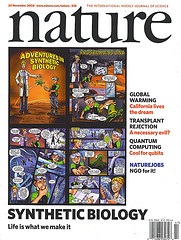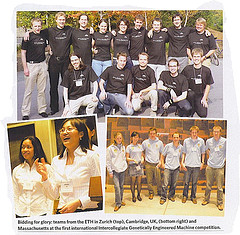Brown:iGEM proposal
From 2006.igem.org
iGEM: Interdisciplinary student competition June-August 2006
With University support, an interdisciplinary team composed of Brown students can represent the Brown at the MIT-based iGEM competition (Genetically Engineered Machine Competition). The challenge is to design and implement a genetically engineered machine and students are set to draw on Brown’s interdisciplinary expertise in biology, chemistry, computer science, engineering, mathematics, neuroscience and physics.
Synthetic Biology: A novel field
In the last decade, a revolution in genomics has shown us the power of the human genome. Through understanding, it can be harnessed to find, and combat harmful mutations that cause the human molecular machinery to breakdown [HapMap, 2005]. Synthetic Biology is a new interdisciplinary field that allows us to not only decipher how DNA holds and translates information, but to use this understanding to produce novel biological machines to start to repair this damage, increase product yields [Keasling, 2003] or deliver cancer drugs to targeted cells in the body [Anderson et al, 2005]. To this end, the field calls upon the knowledge and accomplishments of related disciplines. The November 24th 2005 issue of Nature magazine highlighted the growing field of Synthetic Biology emphasizing the value of the combined intellectual resources of the hard sciences. It is widely acknowledged that research in this field will be at the forefront of science in the coming decade.
Can standard interchangeable parts be constructed in vivo?
The Genetically Engineered Machine competition (iGEM) is designed to test the hypothesis that ”Simple biological systems can be built from standard interchangeable parts and operated in living cells?” [Knight, 2005]. The Brown team wants to test this hypothesis by working over the summer to design and construct such a machine. The competition challenges students to implement a machine capable of performing an engineered task. Unlike other engineering challenges, the machines produced by the competitors are transcribed from DNA sequences, rather than blueprints, and the constituent parts are RNA, proteins and cells, instead of steel, nuts, and bolts. This student-led initiative has backing from some of Brown’s best researchers, bringing together faculty and demonstrating the essential nature of an interdisciplinary approach to hard scientific research.
High-profile international competition
The following is an excerpt from a piece written by MIT senior researcher Dr. Tom
Knight on the genesis of iGEM:
|
"Started in 2003, MIT students created biological oscillators coupled to fluorescent reporters. The summer of 2004 brought the first Synthetic Biology Competition. Student teams from five schools (Princeton, MIT, Caltech, UT Austin, and Boston University) and competed to build cellular state machines and counters. The teams gathered in early November to compare their results. The most graphic project was "photographic biofilm" that could capture an image. In the summer of 2005, student teams from thirteen schools (Berkeley, Caltech, Cambridge UK, Davidson, ETH Zurich, Harvard, MIT, Oklahoma, Penn State, Princeton, Toronto, UCSF, and UT Austin) participated in the 2005 International Genetically Engineered Machine (iGEM) competition. Later, during the first weekend of November, over 150 of these students, instructors, and PIs came together to share and celebrate their work. The iGEM 2005 student projects displayed the designs of chemotaxis regulation systems, cell-cell genetic communications systems, cellular/biological wires, thermometers, biological sketch pads (drawing systems), cellular relay races, a digital counter, and many more. At the core of these activities is the notion of a standard biological part that is well specified and able to be paired with other parts into subassemblies and whole systems. Once the parameters of these parts are determined and standardized, simulation and design of genetic systems will become easier and more reliable." (1) |
Student-led research at Brown
The competition gives students the chance to spend 12 weeks on ground-breaking research in Synthetic Biology. Students will convene over the summer, spending their time designing novel engineered parts, modeling biochemical reactions, and then implementing these designs in the lab. A mentoring board will meet each week in order for students to report progress and to discuss new ideas. The project will contribute to advances in current research in Synthetic Biology. Previous entries in the iGEM competition have been published by students in the journal Nature [Voigt, 2005]. The competition provides a unique opportunity for Brown students engaged in the study of science to develop their own ideas and to start publishing valuable research.
iGEM at Brown
We hope that in coming years the Brown iGEM team can continue to grow, taking on new students and continuing research in synthetic biology at Brown. Research could also continue by establishing Group Independent Study Projects (GISPs) and by continuing the Synthetic Biology Journal Club that we have started this semester. As the leading students from a wide sampling of Brown’s science disciplines, the Brown iGEM team hopes that this genetic engineering program will become an outlet for demonstrating the high caliber of the University’s research endeavors. Through iGEM, Brown will continue to develop its image in the greater community as involving undergraduates in the forefront of cutting edge scientific research. The iGEM competition will foster a competitive image that will put Brown at the top of the list for prospective student scientists seeking intensive research opportunities during their academic careers.
Cross campus faculty support
There are currently 13 undergraduates interested in taking part in the competition. The final number of funded places on the team will be 8 undergraduates but we welcome students with their own funding and graduate students already involved in research during the summer. A synthetic biology journal club has been started in order to begin preliminary research into ideas for the competition. The 8 funded students will be chosen by the faculty advisory board from applications by students and from their participation in the journal club.
| Alex Brodsky * | Assistant Professor in MCB, Ship Street |
| Karen Marie Haberstroh | Assistant Professor of Engineering |
| Robert Hurt | Professor of Engineering |
| Sorin Istrail | Professor of Computer Science |
| Vesna Mitrovic | Assistant Professor of Physics |
| Jeffrey Morgan | Associate Professor of Medical Science |
| Brian Moulton | Assistant Professor of Chemistry |
| Nicola Neretti | Assistant Professor of Physics |
| Tayhas Palmore | Associate Professor of Engineering |
| David Rand | Professor of Biology |
| Art Salomon | Assistant Professor of Biology/Proteomics/Biochemistry |
| J.William Suggs | Professor of Biochemistry |
| David Targan | Dean for Science Programs |
| Marc Tatar | Associate Professor Biology |
| Marjorie Thompson | Associate Dean of Biological Sciences |
| Nancy Thompson | Associate Dean for Graduate and Postdoctoral Studies |
| Jim Valles | Professor of Physics |
| Herman Vandenburgh | Professor of Pathobiology |
| Tom Webster | Associate Professor, Engineering and Orthopaedics |
| Gary Wessel * | Professor of Biology |
* - indicates offer of wet lab facilities
Students currently interested in forming an iGEM team
Graduate Students
John Cumbers - Computational Biology
Sheldon Provost - Electrical Engineering
Undergraduate Students
Annie Gao - Biology
Peter Goldstein - Computational Biology
Nicholas Halden - Computational Biology
Elena Helman - Computational Biology
Julia Heneghan- Anthropology-Linguistics and Human Biology
Brendan Hickey - Computational Biology
Victoria Lattanzi - Biochemistry and French Studies
Jamie Lemon - Biology
Kara Neergaard - Cellular Biology
Megan Schmidt - Human Biology
Julie Spector - Neuroscience and Religious Studies
Elaine Tran - Commerce, Organizations & Entrepreneurship (COE)
Angela Wong - Undergraduate Student Biochemistry
Summary
The international Genetically Engineered Machine competition (iGEM) is a high profile international biotechnology competition. An iGEM team representing Brown University would highlight the University as a liberal arts college with a strong multidisciplinary faculty. By encouraging student participation in cutting edge scientific research this endeavor would enhance Brown’s appeal, as well as enrich the undergraduate and graduate experience. To take part in the competition, we require funding to support the team with lab costs, travel expenses, and stipends to support students over the summer.
==References==
(1) Tom Knight 2005, iGEM: International Genetically Engineered Machine competition.
http://icampus.mit.edu/projects/iGem.shtml
(2) Chris Voigt 2005, Synthetic biology: Engineering Escherichia coli to see light, Nature 438, 441-442 (24 November 2005)
(3) The International HapMap Consortium. A haplotype map of the human genome.
Nature 437, 1299-1320. 2005.
(4) Jay D Keasling, Engineering a mevalonate pathway in Escherichia coli for production of terpenoids, Nature Biotechnology 21, 796 - 802 (2003)
(5) Anderson, J. C., Clarke, E. J., Arkin, A. P., & Voigt, C. A. (2005) Environmentally Controlled Invasion of Cancer Cells by Engineered Bacteria, Journal of Molecular Biology, in press.


